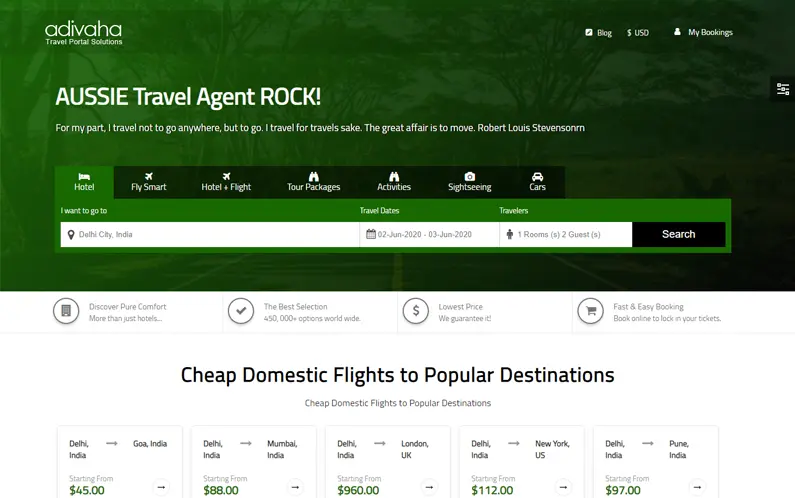Ready to go-LIVE travel solutions that helps your travel agency to sell a range of travel services pretty instantly. adivaha® travel solutions make sure you have no boundation over your imagination, you can do everything online, without the need for any technical knowledge or design skills. Easy Backoffice, extensive reporting with integrated Funds Management System. Upload funds easily and instantly through Netbanking, Debit Card, Credit Card. The best part is, we do offer customizations in case you believe it will boost your business!
How Flight Data APIs Are Changing the Course of the Travel Industry
Discover how Flight Data APIs are revolutionizing the travel industry in our article. Explore the game-changing impact of real-time flight information, enhanced user experiences, and more. Stay ahead in the dynamic travel landscape with this informative read.
In today's fast-paced world, the travel industry is constantly evolving, and adapting to the latest technological advancements. One of the most significant game-changers in recent years is the integration of Flight Data APIs into various travel-related businesses. As a third-party service provider, we understand the transformative power of these APIs, and we are excited to explore how they are reshaping the landscape of the travel technology company. In this article, we will delve into the many ways in which Flight Data APIs are revolutionizing the travel sector and how they benefit travel businesses like yours.
What are Flight Data APIs, and how do they work in the travel industry?
Flight Data APIs, or Application Programming Interfaces, are a set of rules and protocols that allow software applications to communicate and interact with flight-related data and services. These APIs play a pivotal role in the travel industry by providing access to real-time and historical flight information, including data on airlines, airports, flight schedules, pricing, availability, and more. Here's a closer look at how Flight Data APIs work in the travel industry:
Data Aggregation: Flight Data APIs collect and aggregate information from multiple sources, such as airlines, aviation authorities, and global distribution systems (GDS). This data includes details about flights, carriers, routes, departure and arrival times, delays, cancellations, and more.
Data Standardization: Once collected, the API standardizes the data to ensure consistency and uniformity, making it easier for travel businesses to work with the information. Standardization is crucial for accurate and reliable results.
Real-Time Updates: Many flight APIs offer real-time updates, which means they continuously monitor and update data as new information becomes available. This feature is particularly important in the travel industry, where last-minute changes can significantly impact travel plans.
 Transform Travel with Flight Data APIs
Transform Travel with Flight Data APIsSearch and Query Capabilities: Travel businesses can use Flight Data APIs to search for specific flights, routes, or airlines, and they can query the API for detailed information about available flights, pricing, seat availability, and more.
Integration into Booking Systems: Travel businesses can integrate Flight Data APIs into their corporate travel booking platforms and websites, allowing customers to search, compare, and book flights seamlessly. The API can also facilitate the reservation process and provide information about baggage policies, check-in procedures, and more.
Personalization: Some Flight Data APIs enable travel businesses to offer personalized recommendations to their customers based on their preferences and past travel history. This enhances the user experience and increases customer satisfaction.
Competitive Pricing: Flight Data APIs allow travel businesses to display accurate and up-to-date pricing information, enabling travelers to compare fares and choose the best options, thereby making informed decisions.
Operational Efficiency: Beyond customer-facing applications, Flight Data APIs help travel businesses manage their operations efficiently. This includes inventory management, automatic updates for reservations, and proactive customer support in the event of delays or cancellations.
What specific ways are Flight Data APIs influencing the travel industry's operations and services?
Flight Data APIs provide real-time access to flight availability, schedules, and pricing. This enables travel businesses to offer up-to-the-minute booking options to customers, enhancing the booking process and improving the likelihood of securing reservations. These APIs simplify the booking process by allowing travel businesses to present customers with accurate and current flight information, making it easier for travelers to make informed decisions and complete bookings more efficiently.
Some Flight Data APIs support multi-carrier bookings, enabling travelers to create flexible itineraries involving multiple airlines. This flexibility can increase the appeal of travel technology services and result in more bookings. Flight Data APIs facilitate a more personalized and user-friendly experience for travelers. They can provide recommendations based on traveler preferences, offer mobile integration for on-the-go access to flight information, and deliver real-time updates on flight status and delays. Flight Data APIs supply valuable data and insights that travel businesses can analyze to make data-driven decisions. By understanding traveler preferences, booking patterns, and market trends, companies can refine their offerings and strategies.
Online travel business can use Flight Data APIs to efficiently manage their available seats, routes, and schedules, which, in turn, helps reduce operational costs and optimize revenue. Global reach provides access to a wide range of flight data from various airlines and airports worldwide, allowing travel businesses to offer comprehensive services for both domestic and international travelers. Flight Data APIs can incorporate security and compliance features to protect sensitive traveler information and ensure data privacy, helping travel businesses meet regulatory requirements.
Can you provide examples of companies or applications that have successfully utilized Flight Data APIs to transform the travel sector?
Several companies and applications have successfully utilized Flight Data APIs to transform the travel sector by providing innovative travel technology solutions and improving the overall travel experience. Here are a few examples:
Sky scanner: Sky scanner is a popular travel meta search engine that uses Flight Data APIs to provide users with real-time flight information, price comparisons, and availability. It allows travelers to search for flights, compare prices, and book tickets with ease.
Google Flights: Google Flights leverages Flight Data APIs to offer a comprehensive flight search and corporate travel booking platform. It provides users with information on flight availability, and pricing, and allows for easy comparisons between different airlines and travel options.
Kayak: Kayak is a travel booking website and mobile app that uses Flight Data APIs to help users find the best flight deals. It offers features like fare tracking, price alerts, and the ability to compare different flight options.
Hopper: Hopper is a mobile app that uses predictive analytics and Flight Data APIs to help users find the best time to book flights. It provides insights into when to purchase tickets to get the most affordable prices.
Flight Aware: Flight Aware is a global flight tracking and data platform that utilizes Flight Data APIs to provide real-time information on flights, including current aircraft positions, weather data, and flight delays. It's widely used by aviation enthusiasts, airlines, and travel professionals.
Amadeus: Amadeus is a travel technology provider for the global travel and tourism industry. They offer various Flight Data APIs that airlines, travel agencies, and other travel-related businesses use to access booking and reservation systems, flight schedules, and other essential data.
ITA Matrix: ITA Matrix, now owned by Google, offers a flight search and booking engine that integrates Flight Data APIs to provide advanced routing and pricing options. It's known for its powerful search capabilities and flexibility in finding complex itineraries.
Expedia: Expedia is a well-known online travel agency that utilizes Flight Data APIs to offer a wide range of flight options, hotels, and vacation packages. It provides a user-friendly platform for travelers to plan and book their trips.
What benefits do airlines, travel agencies, and other stakeholders in the industry gain from using Flight Data APIs?
Airlines, travel agencies, and other stakeholders in the travel industry can gain several benefits from using Flight Data APIs. These benefits contribute to improved efficiency, enhanced customer experiences, and increased competitiveness. Here are some of the advantages:
Flight Data APIs grant airlines, travel agencies, and other industry stakeholders access to real-time flight information, including schedules, pricing, and availability. This up-to-the-minute data ensures that customers receive accurate and current information when booking their flights, enhancing their overall experience.
By integrating Flight Data APIs into their systems, airlines and travel agencies can automate various processes, leading to more efficient booking and reservation systems. This automation reduces operational costs, minimizes errors, and speeds up the customer journey, resulting in cost savings and improved customer satisfaction.
Flight Data APIs enable airlines and travel agencies to compare prices, availability, and offerings from different airlines. This data-driven approach allows them to remain competitive by adjusting pricing strategies and service offerings in response to market dynamics, ultimately attracting more customers.
With access to flight data, airlines and travel agencies can offer personalized travel recommendations, special deals, and tailored services to individual travelers. By analyzing customer preferences and historical data, they can engage customers more effectively, fostering loyalty and repeat business to business.
Flight Data APIs assist airlines in optimizing flight routes, monitoring aircraft in real-time, and making data-driven decisions. This enhances operational efficiency, reduces fuel consumption, and improves punctuality. It also helps travel agencies make informed decisions about itinerary planning.
Flight Data APIs empower stakeholders to create innovative services and applications in the travel industry. These may include flight-tracking apps, predictive pricing models, and itinerary planning tools. Such innovations not only enhance the customer experience but also open up new revenue streams.
What trends or innovations are emerging in the field of Flight Data APIs that are further shaping the travel industry?
The field of Flight Data APIs is continually evolving, with several trends and innovations emerging that are shaping the travel industry. These developments are driven by advances in technology, changing consumer expectations, and the need for more efficient and personalized travel experiences. Here are some of the key trends and innovations in this field:
● Airlines and travel agencies are increasingly using AI and predictive analytics to analyze vast amounts of flight data. This helps in predicting travel demand, optimizing pricing strategies, and enhancing operational efficiency.
● Flight Data APIs are being employed to offer highly personalized travel experiences. Airlines and travel agencies use customer data and preferences to recommend tailored itineraries, seat preferences, and in-flight services.
● Blockchain technology is being explored to enhance the security and transparency of flight data. It can provide an immutable record of flight information, improving trust in data accuracy and authenticity.
● NDC is an industry-standard developed by IATA (International Air Transport Association) that allows airlines to distribute their content and offers directly to travel agencies and customers. This opens up opportunities for more dynamic and customized flight offerings.
● AR and VR technologies are being applied to enhance the booking and in-flight experience. Travelers can use AR to visualize cabins and amenities, while VR provides immersive in-flight entertainment.
● Flight Data APIs are being integrated with biometric technology to enable contactless best travel website. Passengers can use facial recognition and fingerprint scanning for check-in, security, and boarding.
● Airlines and travel agencies are using Flight Data APIs to offer hyper-personalized ancillary services, such as recommending hotels, ground transportation, and activities at the traveler's destination.
● Efforts are underway to improve transparency in airfare pricing, including full disclosure of ancillary fees, taxes, and other charges. Flight Data APIs play a role in providing transparent fare information to customers.
Thus, Flight Data APIs have emerged as a powerful force reshaping the travel industry in numerous ways. By providing airlines, online travel agencies, and other stakeholders with real-time, accurate, and customizable data, these APIs are enhancing efficiency, personalizing travel experiences, and improving overall customer satisfaction. From AI-driven predictive analytics to Blockchain-enabled security, the travel industry is embracing innovative technologies to meet the evolving needs of travelers.
Keep Refreshing your customers - Who doesn't want his site to stand out from crowd? adivaha® gives you multiple options for home pages, headers, colors etc. Which can easily be managed from admin via shortcodes and settings. The theme supports almost all the big players in this market ie, WEGO, Travelpayouts, Agoda, Booking, Expedia etc.












